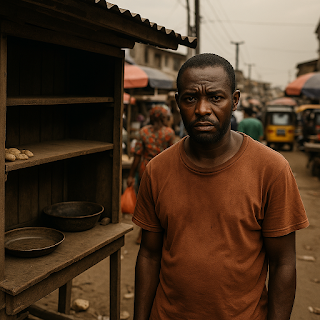In homes across Nigeria, millions of citizens woke up not to the sound of alarm clocks, but the harsh hum of silence no electricity, empty gas cylinders, and a fridge with barely enough to make breakfast. From the slums of Ajegunle to the streets of Kano, the story remains the same: no food, no clean water, no stable power, and no jobs.
The cost of living has soared to unprecedented levels. Inflation is currently eating into the very bones of the average Nigerian. In just the last 12 months, food prices have doubled. Sachet water now costs more than a loaf of bread did a year ago, and fuel scarcity continues to drive transport costs out of reach for the everyday worker.
Also Read: “What Needs to Change Now: Real Solutions to End Nigeria’s Fuel Struggle”
What’s Behind the Crisis?
Economic experts point to a dangerous mix of factors:
• Overreliance on Oil Revenue: Nigeria’s mono-economy continues to suffer from global oil price instability. When oil sneezes, the entire nation catches a fever.
Also Read: Nigeria Eyes Agricultural Renaissance: Bumper Harvest and Export Leadership on the Horizon
• Naira Devaluation: The continuous fall of the Naira has made imports more expensive, and since Nigeria imports everything from toothpicks to petrol, the burden rests squarely on citizens.
• Unemployment Crisis: Over 33% of Nigerians are jobless, with youth unemployment hitting disturbing highs. Even graduates roam the streets with CVs and hope but no answers.
Also Read: Will Africa Still Be the World’s Resource Giant in 50 Years? Experts Begin to Question
• Power Outages: Despite billions spent, Nigerians still face daily blackouts. Businesses fold, factories run on diesel, and productivity crashes.
• Policy Instability and Corruption: Constant changes in economic direction and widespread government mismanagement have eroded investor confidence and local productivity.
Also Read: U.S. Tightens Visa Rules for Nigerians: New Policy Effective
What Will It Take to Fix This?
Economists, activists, and citizens agree: Nigeria’s survival depends on action, not just prayers.
Here’s what could help:
Also Read: Is Nigeria Ignoring the Truth About Boko Haram Funding?
1. Diversify the Economy: Heavy investments in agriculture, mining, and tech could reduce reliance on oil and boost employment.
2. Stable Power Supply: Without constant electricity, no economy can thrive. Power reforms must go beyond lip service.
Also Read: Why President Jonathan Deserves More Credit
3. Support Local Manufacturing: Policies that favor local businesses over imports will grow jobs and reduce inflation.
4. Fight Corruption Seriously: Until public funds stop vanishing, infrastructure and services will remain broken.
Also Read: Until Atiku Fixes the Power Problem He Helped Create, Nigerians Will Keep Rejecting Him
5. Currency Stabilization: Central Bank reforms and transparent FX policies can help tame inflation and stabilize the naira.
6. Invest in People: Education, healthcare, and skills training must become national priorities not just budget items on paper.
Also Read: If Dangote Truly Cares About Nigeria, Let Him Join the People in Protest Over Fuel Prices
The People’s Resilience
Still, despite all odds, Nigerians remain some of the most resilient people on earth. They hustle, adapt, and survive. But they are tired. Tired of surviving. Tired of empty promises. Tired of policies that favor a few while millions suffer.
If Nigeria must rise again, it will take more than hashtags and headlines. It will take action bold, honest, and relentless.











No comments:
Post a Comment
Join the conversation by leaving a comment below. Keep it respectful, relevant, and on-topic - we love hearing from our readers!